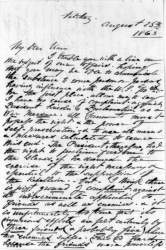Record Data
Transcription
Natchez.
August 25th
1863
My Dear Mary
I trouble you with a line on the subject of our affairs, hoping that you may be able to communicate the substance to some person or persons having influence with the U. S. Govmt.-- In the first place -- allow me to say I have no cause of complaint against President Lincoln's Proclamation as a War Measure. All Goverments must possess the right & the power of self-preservation, -- & to use all means & measures calculated to secure this end. The President, therefore, had the right to proclaim freedom to the slaves -- if he deemed the exercise of the right necessary & essential to the suppression of the Rebellion -- but -- I think there is just ground of complaint against its indiscriminate application to friends as well as enemies & it is unfortuneately too true that its injurious effects are felt certainly by three friends (& probably five) where two enemies suffer. This is hard because the friends were powerless against the numbers opposed to them. It is further hard -- because the Confiscation Act is less [incessing?] in its destruction. It discriminates, & only operates on those found in actual rebellion with officers or soldiers in the Rebel ranks or those holding civil offices under the Rebel Govmt. If possible -- this great grievance should be remedied. It furnishes a strong argument against the U. S. Govmt -- which the secessionists do not fail to use, -- & use freely. Why would not the President allow the Army officers commanding districts -- to exercise a sound discretion in bringing the Proclamation to bear on the inhabitants of their respective districts? But again -- there is a strong & daily increasing desire to return to the Union, -- under a pledge to the adoption of a gradual system of emancipation. Efforts are now making to bring this about.-- Already the converts are numerous -- very numerous, & among those -- too -- most actively engaged on the secession side. All that is now wanting to give success to this movement is some official assurance that the rights of property holders (of any description) will be recognized on our return to the Union with the pledge on our part that immediately thereon a system of gradual emancipation shall be adopted by our State Legislature -- on just & equitable terms (without compensation in money, but liberal terms as to time.) Can the Govmt ask more than this? Could the people of the Northern & Western States desire more? Would it not be infinitely (& to all intents & purposes) better for them than Emancipation under the Proclamation? The people of the U. S. Govmt cannot be benefitted by the total & sudden prostration of our productive powers! by the extinction of our entire prosperity. If we are to live again under one Union & one Govmt -- we must live in mutual dependence on each other. Taxes for the payment of the Govmt debt cannot be collected from a people utterly ruined. The sudden emancipation of our slaves would so reduce the value of the lands -- that the fee simple would not sell for as much as could & would be collected from the people when in the enjoyment of their rights as slaveholders. But -- is it not important to bring back as speedily as possible the States of Texas, Louisiana, Mississippi, Arkansas, & Tennessee? How long after would it be before Alabama, Georgia, Florida, & North Carolina would follow the example? I cannot think otherwise than that the Govmt of the U. S. ought at once (& without a months delay) to invite the people of these States to return to the Union. It wants but some assurance that they will be treated as the Prodigal Son (so beautifully illustrated in the Scriptures) & they will gladly manifest their penitence if they can be assured that their acknowledgment will not be spurned & scorned: (signed) Stephen Duncan.
[Note 1 This letter was enclosed in a letter from Reverdy Johnson to Lincoln, September 19, 1863. See Collected Works, VI, 481.]









